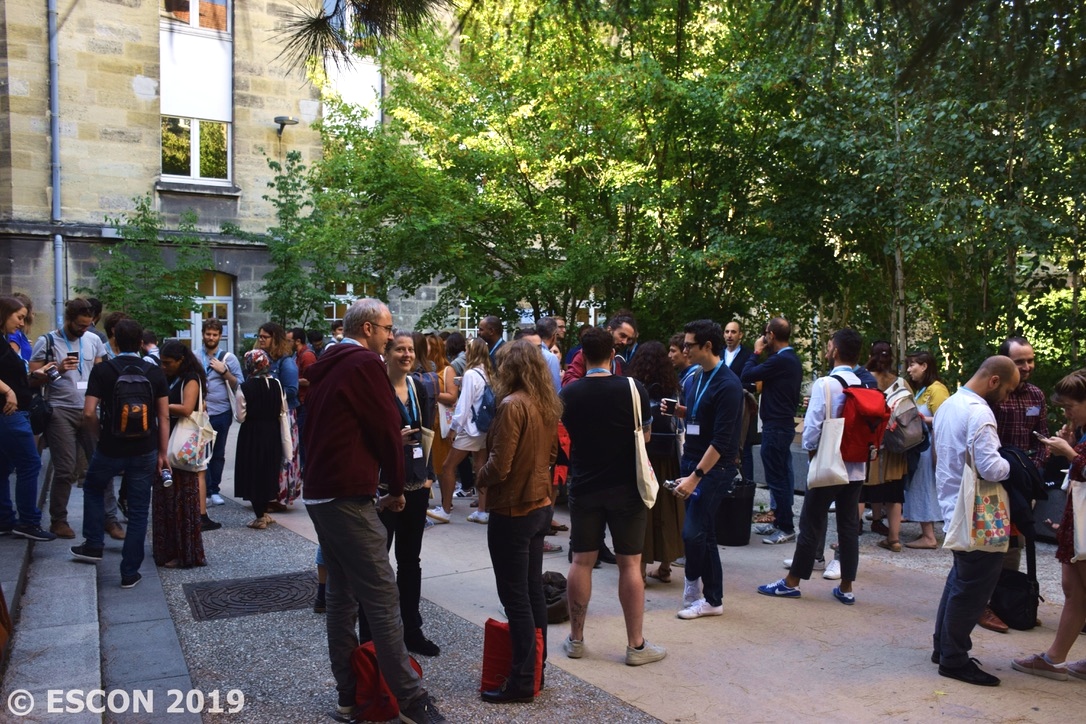Meeting Report of the 21st ESCON Transfer of Knowledge Conference
28.10.2019, by Tina Keil in grant report, meeting report
2-4th September, 2019; University of Bordeaux
Organized by François Ric, Antonin Carrier, Alice Follenfant, and Baptiste Subra
 in total, 9 pictures
in total, 9 pictures
The 21st edition of the European Social Cognition Network (ESCON) Transfer of Knowledge Conference, sponsored by the European Association of Social Psychology (EASP), the University of Bordeaux (IdEx), the University of Cologne and the University of Louvain-La-Neuve, was held in Bordeaux, France, in September 2019.
The meeting provided the opportunity to bring together, over three days, more than 100 researchers in social cognition from all over Europe (Austria, Belgium, France, Italy, Germany, Netherlands, Poland, Portugal, United Kingdom, Switzerland) and beyond (Israel and the USA) to exchange on their last findings and their future research programs. As it is now traditional for a Transfer of Knowledge Conference, it targeted more directly junior researchers together with a smaller proportion of senior researchers (about 30%) who came to share their passion and knowledge. The conference offered a wide range of research topics on social cognition, which was reflected both in the variety of the thematic sessions (e.g., approach/avoidance, face processing, implicit measures, emotions, self, moral cognition, consumer cognition, prejudice) and in the broad coverage provided by the three keynote speakers. Jean-Claude Croizet (University of Clermont-Auvergne), who discussed the necessity to embed social cognition research in the social context, Roland Imhoff (Johannes Gutenberg University Mainz), who presented his research on judgments and social perception, and Agnes Moors (KU Leuven), who presented her thoughtful conceptualization of a dual-process model of behavior. By making connections between levels of analyses more apparent, this made the event particularly stimulating for all the participants.
These sessions were complemented by the organization of two exciting workshops. One was proposed by Mandy Hütter on the application of multinomial process model to social cognition research. The other one was proposed by Christian Unkelbach on the interpretation and analysis of interactions in ANOVA designs. The last day was also the occasion to congratulate Felix Kruse (University of Hamburg) for receiving the ESCON 2019 best paper award (Kruse, F., & Degner J., Spontaneous state inferences from behavior).
In addition to this rich scientific program (a total of 101 talks including parallel sessions, keynote speakers and workshops), the organization of lunches, dinners and a social event, fully contributed to facilitating interactions and discussions between researchers in a less formal but no less useful way for the development of new research ideas and collaborations.
According to comments heard here and there during the meeting, and given the audience in the conference rooms, the aims of the meeting – sharing and stimulating – have been fully reached. This was also made possible thanks to the wonderful audience who lively debates, during the sessions, the coffee breaks, meals, and sometimes even until late in the night.